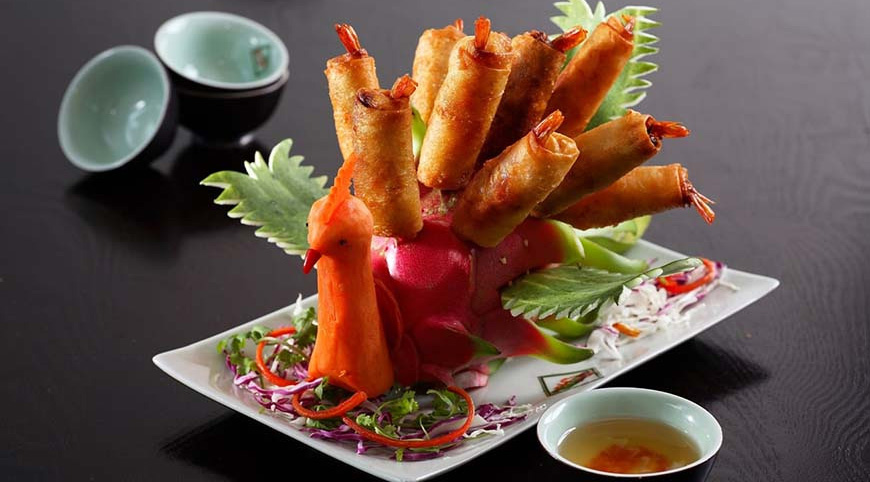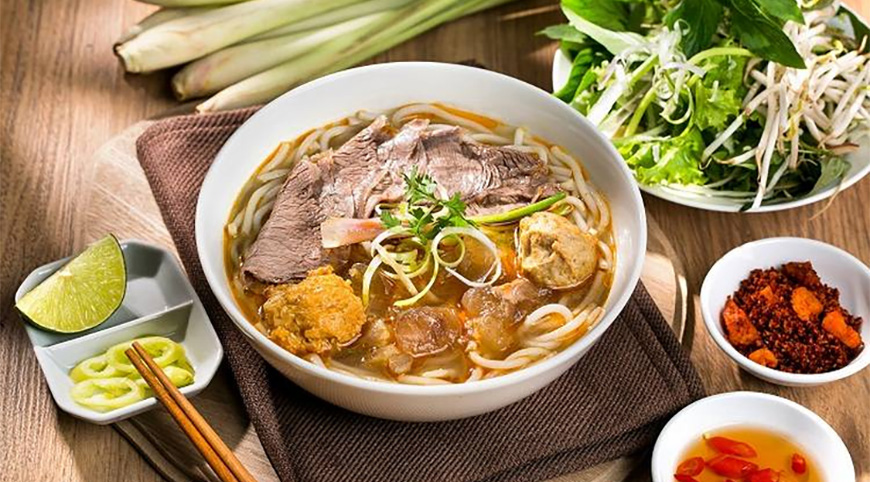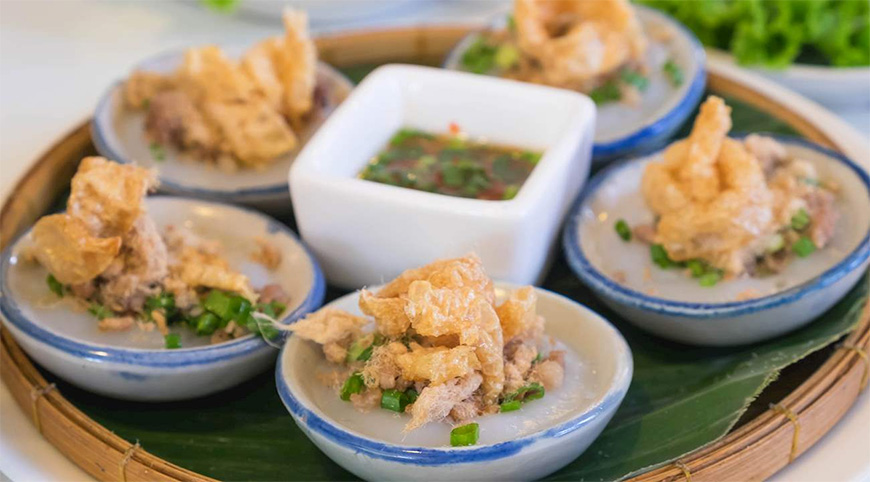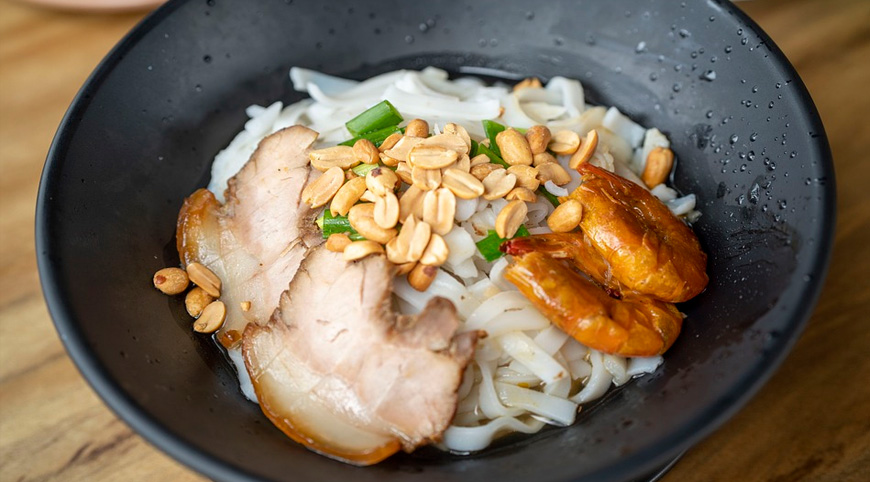In addition to the country’s natural beauty combined with the smiling hospitality of its people,
Vietnamese cuisine is strongly distinguished by its regional contrasts. Our food tour started with the
Cuisine of North Vietnam continues here with the discovery of the flavors of the Center of the Dragon Country.

Nem cong (peacock spring rolls) - One of the dishes of Hue royal cuisine - Image : Internet
Small reminders on Vietnam’s cuisine
Perhaps more here than elsewhere,
Vietnam’s cuisine reflects the culture and soul of its people. All its people. Let’s not forget that with
53 ethnic minorities joining the majority Kinh ethnic group,
Vietnam’s cuisine echoes it as tasty as it is diverse, offering adventurous taste buds a formidable culinary heritage. Thus, the inhabitants of the central highlands are known to cook raw pork mixed with herbs and seasonings.
In addition,
the cuisine of Vietnam also has its roots in this Asian culture based on the balance of 5 elements - Earth, Water, Fire, Metal and Wood. It is therefore not surprising to find this integration of the five elements in the nutrition, taste and colors of typical Vietnamese dishes. For the visitor, the most spectacular of this incorporation is seen in the use of the five colors in the preparation and presentation of the dishes: the yellow to represent the Earth, the black to signify the Water, the red color for the Fire, white for Metal and green for Wood. More subtly the number 5 will also run away in the balance of sweet, salty, bitter, sour and spicy tastes. This balance allows a fluid circulation of Yin and Yang energies, where – as far as cooking is concerned – dishes considered cold or fresh are accompanied by warm or spicy condiments. Example : Sour (yin) harmonizes with spicy (yang). The balance of Yin and Yang also manifests itself through the selection of ingredients and the way of serving dishes according to the season. All this to respect the balance of Yin and Yang.
Culturally, the meal is an important aspect of society. Not only to have fun during a banquet shared with family or friends, but also – perhaps above all – to transmit and maintain the fundamental traditions of community life. For example, it is during family meals that the youngest are required to invite the oldest, demonstrating their respect for their elders, according to a hierarchy and codes that govern Vietnamese society as a whole.
Features of the Annam cuisine
One of the things to know about Vietnam’s dishes is that the menus can vary greatly depending on whether they are cooked in the North, the Center, or in the South of the Country with two Deltas.
It seems that the people of central Vietnam – called Annam by the French settlers – are more demanding guests than those of the North and South. In addition, imperial cuisine is recognized as the emblematic cuisine of this region. In fact, the gourmet who visits Hue will be especially impressed by the sophistication and refinement of imperial dishes. But more generally, the taste buds are jostled here by the very spicy character of the dishes, while the eye falls on the pretty mix of colors and the creative way of presenting the dishes. Distinct tastes, strong flavors and colors in shades of red and dark brown, not to mention the popular local seasonings that are «Mam tom chua» (based on shrimp and green papaya) and different varieties of shrimp pasta – all this characterizes the unique cuisine of Central Vietnam.
► Read our : Hue Highlights & Travel Guide
What to taste in the cuisine of the Central Vietnam
Bun Bo Hue

Iconic Bun bo Hue - Image : Internet
Often eaten for breakfast, this Hue beef noodle soup is made with pork and beef bone broth, special noodles, lemongrass, shrimp paste, lime juice and a range of herbs. This soup with rich and complex flavors is much spicier than most Vietnamese soups. If its name seems to say that it was born in Hue, its exact origin and its creator are totally unknown to us.
Bun bo nam bo
A dish that could be translated as beef noodle salad, South Vietnam style, Bun bo nam bo is one of the signature dishes of Central Vietnam. Its name describes it perfectly: bun means noodle, bo means beef and nam bo refers to the south of the country. The main ingredients include beef, rice vermicelli, garlic, fresh herbs (coriander, mint) and vegetables (carrots, cucumbers, lettuce, bean sprouts). By delicacy you can sprinkle all roasted peanuts and fried shallots.
Com hen Hue
Originally from the imperial city of Hue, this unique specialty dating from the eccentric emperor Thanh Thai (Nguyen dynasty 1889-1907), is based on small clams, or «hen». These are served on a bed of fragrant rice and come with a range of tempting toppings for the taste buds: including crispy pork rind, aromatic herbs, grated green mango and crushed peanuts. The dish offers not only an explosion of flavors and textures, but also a surprising cultural experience where rusticity and royal influences have shaped the cuisine of the region. There are versions based on noodles or vermicelli instead of rice (Mi hen, Bun hen)
Banh bot loc
These dumplings stuffed with tapioca look like translucent ravioli. Usually prepared with tapioca, their filling happily combines shrimps and fatty pork. Probably born in Hue, these ravioli are steamed, wrapped in banana leaves. They are traditionally served with a dip made with fish sauce.
Banh beo

Banh beo, small is the new delicious - Image tasteAtlas
We are here on a salted rice cake, steamed, where the key ingredients are rice flour, fish sauce with green peppers and shrimp or pork. In addition, noodles, roasted peanuts or fried onions can be added to the cake to boost flavors and textures. There are also sweet versions, which can be found almost only in Hoi An city. Banh beo is traditionally served in a porcelain bowl and bamboo spoon.
Banh trang cuon thit heo
Originally from Da Nang, this dish looks like these spring rolls called "goi cuon", but with a typical local touch. Instead of using rice paper, this version uses banh trang, a lighter and thinner type of rice paper. The way to treat yourself is to place a pork filling (thit heo) and some fresh herbs carefully on the banh trang and roll it carefully. Healthy, light and delicious.
Cao Lau
A dish consisting of roasted pork accompanied by rice noodles, Cao Lau is the emblematic dish of Hoi An. If you find it elsewhere, there is a good chance that it is not very delicious. Here, everything is in the alchemy of the ingredients and their preparation: the rice used in the composition of the noodles is a local rice a little special, cooked in a solution of water from the local well (Ba Le) + ash from local shrubs. Plus a touch of mystery and secret of the cook, it goes without saying. In addition to noodles, a bowl of Cao Lau hosts thin slices of roasted pork (char siu), greens, bean sprouts, croutons prepared with the same ingredients as noodles and just a little tasty broth.
Mi Quang

Mi Quang, only in Hoi An ! Image : Pixabay
This specialty from Quang Nam Province is best enjoyed in Hoi An. What really sets this dish apart is the turmeric infused broth poured over a combination of white and flat noodles with egg yellow noodles. Fresh vegetables and roasted peanuts keep them company, as well as banana flowers, lettuce, coriander, green onions and Vietnamese coriander. The filling is usually composed of pork belly, chicken, shrimp, fish, boiled eggs, not to mention coarsely crumbled crackers.
Nem nuong Nha Trang
As its name obliges us to know, nem nuong is a kind of grilled nem from Nha Trang. The roll in question is in fact prepared with fat and ground pork meat, seasoned with garlic, fish sauce, shallots, sugar and black pepper. This preparation is shaped into patties that will cover skewers that will themselves be passed over a wood fire. Once cooked, nem nuong can be served in several ways: with steamed rice and fresh or marinated vegetables; wrapped in rice paper; accompanied by rice noodles or in a banh mi, the famous sandwich Made in Vietnam.
And finally, not to forget the regions of Da Lat, Dak Lat, Buon Ma Thuot… , let’s mention grilled chicken and sticky rice cooked in bamboo (Ga nuong com lam Buon Ma Thuot/Ban Don). A simple but tasty recipe with its tender grilled chicken. Gallinaceous has previously been marinated in a tasty blend of herbs and spices, which gives this signature dish of a whole region a unique flavor to satisfy the most demanding palates.
Do not miss to read :